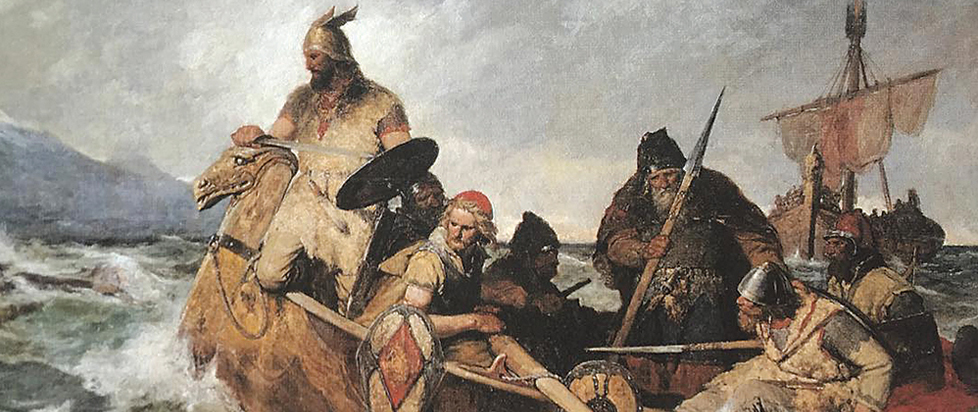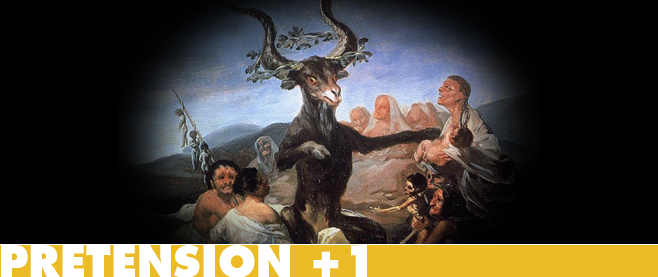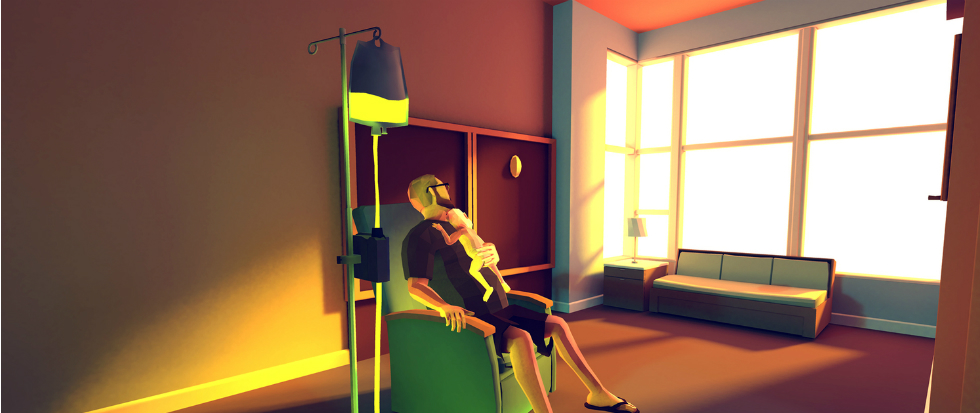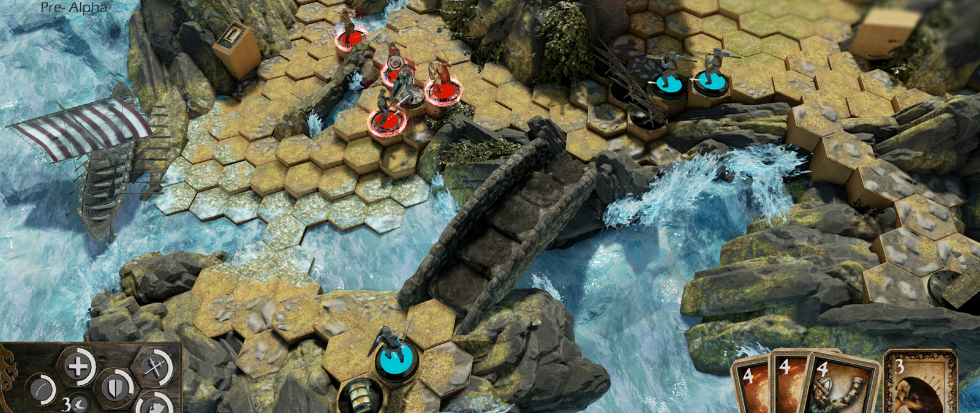
Diary of a 1st-Time Interactive Fiction Developer – Part 78: Skip to the End
This is the last in an ongoing series about a fumbling idiot’s attempt to write some interactive fiction. You can find pieces one, two, three, four and five here, here, here, here and here if this is your first time with the series and you don’t want to miss out on important thoughts on piratical dental hygiene.
———
Well. It’s been a long journey we’ve made together, you and I. Over three years of regularly published diary entries exhaustively chronicling the production process for my ten-minute-long piece of interactive fiction about Vikings.
You’ve been silent. But without having you there – without your constant, unwavering support – I would never have ever finished the game.
You were there the first time I figured out how to crash my computer with the interactive fiction editor. You were there for all the dithering over spellings and paragraph lengths and the choices I should offer to players. For that thing with the potato and the vacuum cleaner. That sad little potato never saw it coming. Poor thing.
We’ve really been through it, haven’t we?
Wait.
What?
My last seventy-three diary submissions went to spam? Nothing’s been published since part five? It’s almost as if I’d invented all seventy-three entries because I stopped working on the game for a year and a half after I got a new job?
Well, this is all very irregular. But I suppose I could summarize the development process for you, rather than publishing all seventy-three in one go.
Last time I left you, I was writing a piece of interactive fiction in Inklewriter, a very intuitive and visual editor. The game had everything. It had pirates. It had cowboys. It had quips as pithy as an over-ripe lemon and twice as sour.
At some point over the next year and a half of development – again, definitely not while I was working a new job and ignoring the game completely – Inklewriter was effectively shut down. It was just, the makers said, too much hassle to maintain. What they didn’t say was that they’d chanced on a half-made sky pirates vs cowboys mash-up on their servers that the world wasn’t ready for yet. That they had to shut the whole thing down before it broke Capitalism.
I looked around me and I saw that they were right. A Day in the Totally Ordinary and Unexciting Life of an Everyday Cowboy Bank Security Guard was too raw. Too real. Maybe in twenty years, when folks have stopped burning down the Amazon, everyone has access to equal standards of education and medicine and we’ve finally all learned to be civilized and to get along, I’ll finish work on it.
For the time being, I needed an idea and that new day job I didn’t have provided me with exactly that.

A New Idea
I research Viking literature and religion for a living. Most of what I do ends up in books or journals that only university libraries can afford, crammed with language so dusty that you have to dig them off the shelves with a shovel.
But most of the stories I read and write about are as good as you’d expect from tales that managed to survive being passed on in speech, generation to generation, sometimes for hundreds of years before they were really written down by anyone. A story has to have some solid imagery to endure being retold for the umpteenth bloody time to a crowd of restless Icelanders, who’d been squeezed inside the smoky living space night after twenty-hour night in the depths of an Icelandic winter. English-speaking writers have been leeching off them for hundreds of years. I wanted to be the latest in that long line of leeches.
The myth I decided to adapt is the big one. Called Völuspá (‘The Seeress’s Prophecy’), it’s a poem that recounts all the major decisions the gods took over the course of mythic history and explains how they (and the poem’s human audiences) have arrived where they did, on the cusp of a celestial battle that will end the world. It’s Viking millenarianism, pronounced in the voice of a maybe-already-dead prophetess for the benefit of the god Odin.
In my game, I wanted the player to make the gods’ decisions and for those decisions to change how the world would end.
Now of course that’s going to sound pretty darn exciting to all right-thinking people, but Völuspá throws up barriers to its enjoyment. It’s episodic, it’s awkward and, in places, it’s extremely obscure, alluding to events more than narrating them, presumably on the basis that the poem’s original audiences would have known those events so well that they didn’t need the details again.
The other major problem with adapting Völuspá is the moral values of the people who composed it. The Vikings weren’t pre-historical white nationalists but neither were they the enlightened politically progressive feminists they’re sometimes made out to be. For example, one of the major poems, Skírnismál, describes someone being coerced, through increasingly graphic threats, into a sexual relationship with a god, and for contemporary audiences of the story, that might have been fine. The someone in question was one of the gods’ enemies (and by extension the audiences’ as well). Sexual politics were different.
Neil Gaiman dealt with this by adapting a less, in his words, “rape-y” version of the myth for his recent Norse Mythology, though even the version he chose seems already to be a bowdlerization of Skírnismál’s plot. For my own iteration, being interactive fiction meant I could allow players to decide their own level of complicity in the horrible acts that are perpetrated without denying the cultural differences between us and the Vikings. Hopefully that’s the – or at least a – right compromise in this case.
In other ways, Völuspá’s an obvious choice for adaptation. Being episodic, its narrative can’t branch very far, and on the one hand this diminishes the game’s replay value, as players are less likely to get a sense of their play experience changing after they restart. On the other hand – the hand that was waving enthusiastically at me while I was searching for a new game idea – fewer paths through the game means less writing and fewer variables to account for when developing the game’s endings. Being episodic also makes it easier to slip in materials from other Old Norse poems, like Skírnismál, where I think my mythic history lacks an event or a character.
For me, Völuspá’s also a good example of my research: Viking seeresses and gods – how were they supposed to know what they knew? What’s the underlying Viking philosophy of fate? And, especially, how fixed was an Old Norse story? A Viking tale could have its action, its characters, its ending or message changed when it was retold, which often made it easy to find choices to present to the player about how an episode should proceed.
Basically, I set out to make a work of edutainment. I hope it lives up to the proud legacy of I.M. Meen (36 levels of correcting grammar!) and STD-education game Sex Squad.

Tooling Up
I wrote Völuspá: The Game (as it isn’t called) with Inky, which is effectively a more intimidating version of Inklewriter from the same company and the tool that they use to produce their own games.
Inky has most of the same features as Inklewriter but works with something that looks from a distance like actual code and so made me feel like a technology wizard. That was enough for me, but if you ask more from your software than I do, Inky also has non-wizard-related advantages.
Users do have to learn to write in very simple markup language (i.e. the text of a document is annotated with tags that tell a computer how to manipulate it), but it is relatively intuitive and easy to learn. The guides that Inkle provide to using their editor are useful (see here, for absolute beginners and here in more depth) and other tutorials can be found online too – I found Dan Cox’s offerings especially handy. I still have no idea how to use some features, but with the help of the guides and a lot of experimentation it’s apparently possible to figure enough out to make a full (if small) game. If you could look at my script in Inky (and I’ll send the file to you if you ask), you’d see me gradually learning how to use the editor, my solutions to problems at the start being a lot cruder than the ones I found later on.
The ability to use variables made controlling the multiple endings easier than it would have been with Inklewriter – annoy the giants X many times, for instance, and they’ll want to have a scrap with you; another three times and Ratatoskr, the giant squirrel of Old Norse mythology, will take their side as well (not something that actually happens in the game; just important to note cosmic rodents where they appear in religious texts).
Inky is really designed to be plugged into another game-making engine like Unity, which would take care of features like graphics and sound. I almost worked with someone else to develop that, and I’ve no doubt it could have looked amazing, with images around the text becoming more ominous as the end of the world approaches and in responses to players’ choices. Working with Unity would also have fixed some of the quirks of Inky. The way that players’ choices connect to previous game text is often inelegant, leaving a gap between them, and something I could only deal with using ellipses. When this game goes whatever the equivalent of multi-platinum is for niche-interest, freely distributed interactive fiction, those fixes will be in Version 2.0.
In the meantime, Inky can handle pictures but not sound (as far as I could work out), so I knocked up a few intentionally rough sketches to complement and explain the text as well as to act as a reward for players reaching certain points. In the end, I may have left them too rough. Version 1.5?
Inky’s final and most glorious benefit, as far as I’m concerned, is that anything produced is very easy to distribute. Just click on the ‘Export for web…’ option in the menu bar, and Inky will create a bunch of files that load in a browser. These can then be uploaded to Itch.io (internet repository of gaming things cool and weird) and international superstardom naturally follows. That’s the bit I’m waiting on now.

Playtesting
From the start of the design process, a major question was how much to transform Völuspá. How much to change its values, the choices the gods had, the poem’s structure? My first iterations kept closely to my source’s narrative framework, which, even though Völuspá is intended as a poem of prophecy, meant spending 4/5 of the game actually reciting events that supposedly had already happened in Odin’s life. Prophesizing was confined to that last fifth.
Playtesters who were researchers of Old Norse loved this. Everyone else hated it. In fact, it seems to have stopped them from understanding even what the point of the game was. Players without experience of Old Norse were always likely to be overwhelmed by all the unfamiliar names and words anyway, even with identity tags like “the goddess” and “the wolf” included before names as explanation. Völuspá’s unusual and awkward structure exacerbated this confusion.
I attempted to resolve this through more careful exposition at the start, trying to clarify in my narrator’s voice that players’ choices would be remembered by the game and affect the ending received. But the issue was only really alleviated by changing the structure to make it 4/5 or more prophecy (suggested by one tester).
The game’s name, Choose Your Own End to the Viking World, was likewise partly chosen in response to the playtesters’ difficulties. It’s unwieldy but less nichifying than Völuspá: The Game and almost as much a one-line instruction manual as it is a name. Most people have some idea of what a Choose-Your-Own-Adventure is, even indirectly, and so I’m hoping the mechanics of the game, as well as its setting and the stakes, are made clearer by its title.
Ultimately it might be beyond my abilities as a writer to get the balance completely right. Even if I couldn’t, the playtesters were unquestionably helpful, and it’s hardly their fault if I can’t fix the problem they identified. The diversity of the group was especially useful, and if my group of friends was more socially diverse I’m sure it would have thrown up other issues I hadn’t foreseen as well.

Next Week
If I was serious about this, I would be doing a marketing campaign. Or in my dream world, someone else would be doing that for me because as little as I knew about making interactive fiction when I started this diary, I know far less about marketing. Check out my Twitter profile. See if I have any clue about how to talk to a mass audience. Hope you like retweets of pictures of old stone monuments.
Thanks for following the diary, whether you caught all the available entries or skipped to the end. Play Choose Your Own End to the Viking World (here) if you want to absorb 1000-year-old storytelling in the form of a series of multiple-choice questions, and hit me up on Twitter if you want to quiz me with very basic questions about Inky, the Vikings or whatever.
Otherwise, there is no next week. That’s it. I’m done. See you again whenever the world can finally handle A Day in the Totally Ordinary and Unexciting Life of an Everyday Cowboy Bank Security Guard.
TL;DR
I finished a game. It’s got Viking gods in it. It confused some people a bit when they played it. Hopefully it doesn’t anymore. I wrote way too many words for Unwinnable about making it and, if you like, you can play it here.





